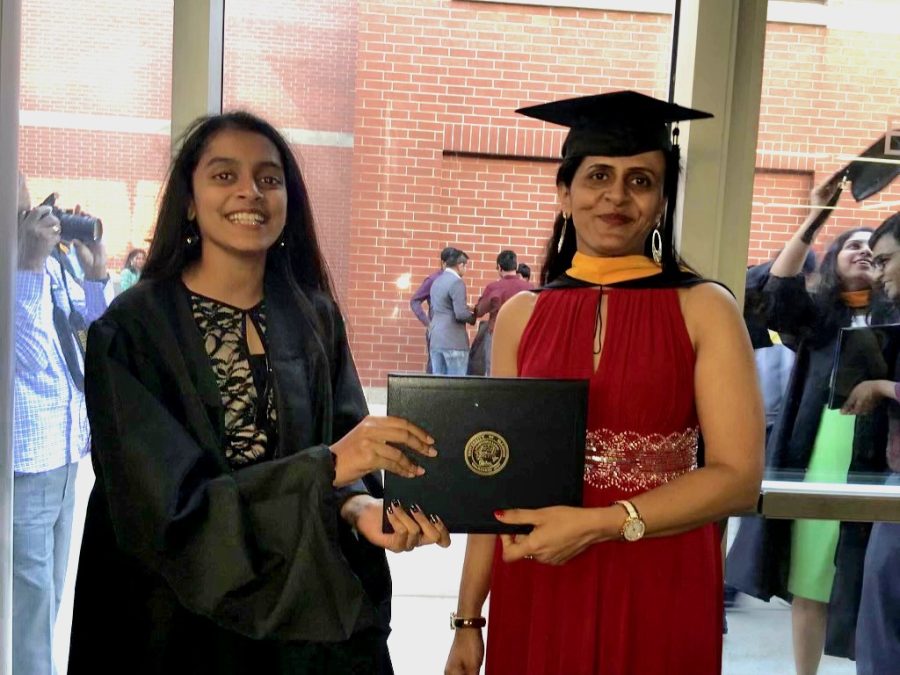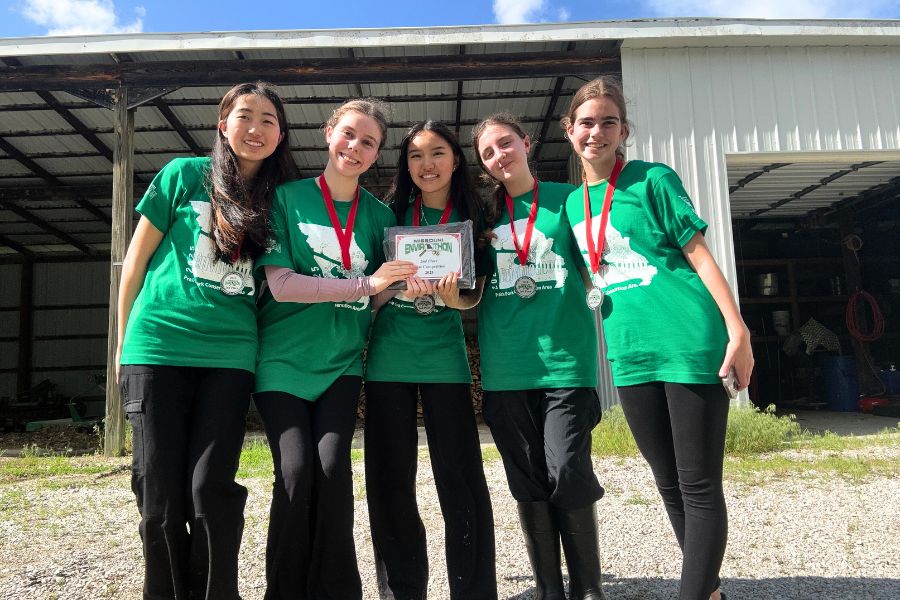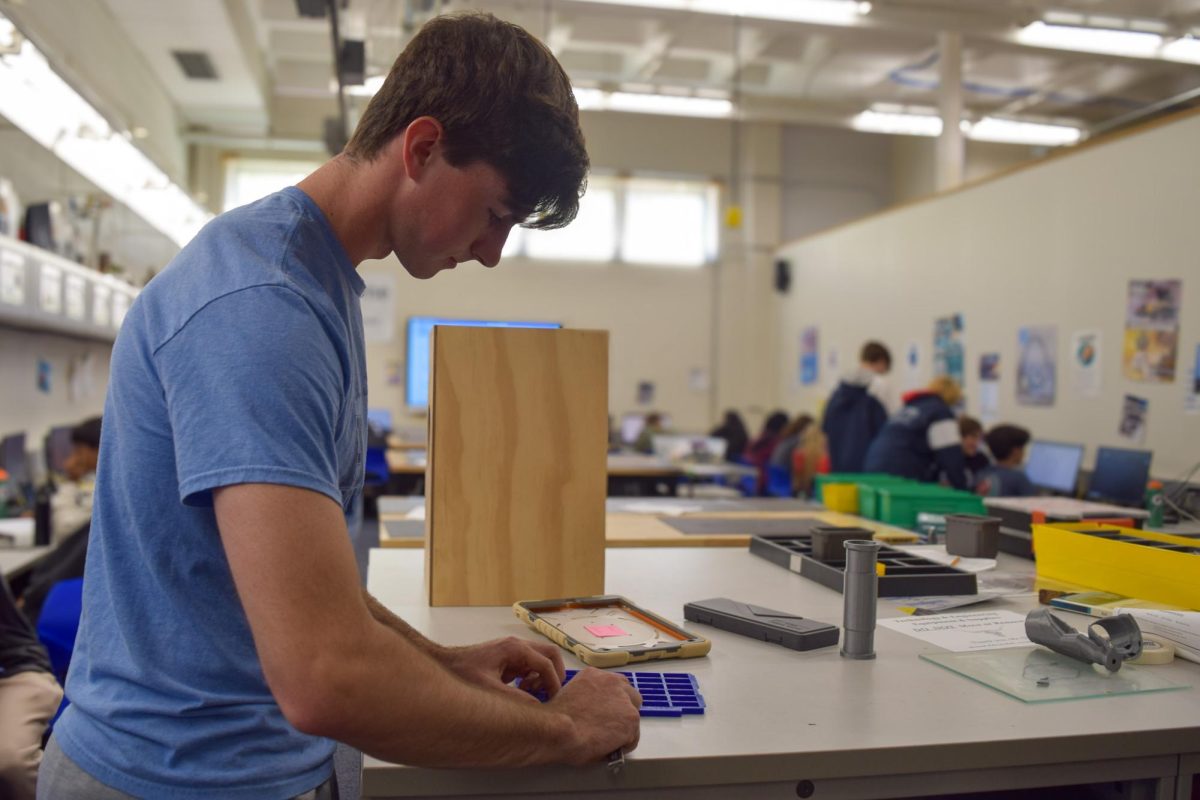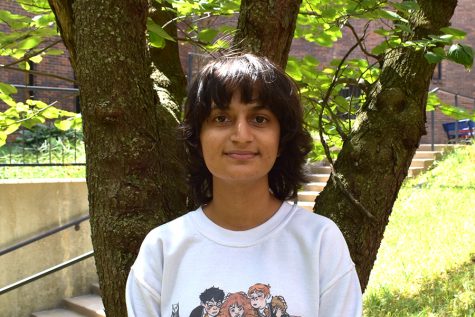Anyone who has taken an American history course has heard of the melting pot analogy. Immigration has always been central to American history, and even today, America welcomes people from around the globe. However, immigrating and getting American citizenship has gotten more complex. It can take up to 10 years for most immigrants to get a green card and at least five more to get citizenship. Students that are still in this process nearing graduation are facing another struggle altogether, one that is virtually unknown by most peers or teachers.
Senior Sindhu Kalabhavi
For senior Sindhu Kalabhavi, her delayed green card process will have a lasting impact on her future. Her family first immigrated to the United States when she was in kindergarten, and they are currently five years into their green card process.
“Being an immigrant is a pretty unique experience. It’s like I’m caught between two worlds and exist in a separate space,” Kalabhavi said. “I’m glad [my family immigrated] because it’s hard to imagine my life not being here. I would be a totally different person. It benefited my future and my quality of life. The environment is a lot cleaner with less pollution, and there are more opportunities to explore, learn and meet different types of people.”
Kalabhavi is still dependent on her father’s H-1B work visa, but she can only stay on it for three more years. Then, once she turns 21, she will have to get her student or work visa.
“I had a friend whose dad’s work visa expired, so they had to move [out of the country]. It was really sudden. It’s hard to adjust to the educational system [in that scenario], and you’d be completely shifting your focus. Everything you wanted to do growing up, you probably wouldn’t be able to do anymore. You’d have to create a new path for yourself and probably change your career choice,” Kalabhavi said. “It’s a loss of control over your own life. There’s that fear that since we’re not citizens, anything could go wrong. It’s always in the back of my head.”
As long as Kalabhavi is under a work visa, she is forced to go into a specific career field that is prioritized by job companies or in high demand. This includes mainly technical skills and STEM-related fields like engineering or computer science. If Kalabhavi doesn’t find such a job by the time she is 21, she might be forced to leave the country. However, Kalabhavi says that she has virtually no other options and has to follow the career path that has been chosen for her.
“[Immigrating here] is harder than most people think. It’s a long, complicated and confusing process,” Kalabhavi said. “I’m just going to do what is planned for me because it’s easier than going out and searching for other options. This is the only path that I know. I have to choose one of those fields if I want to get my work visa or get married to someone here. I’m going to do a lot of things because I just have to, chasing that sense of safety and survival before my passions or personal interests.”
If she gets her green card, Kalabhavi can pursue more diverse career options without worrying about her visa or sponsorship by a company. For example, she wishes she could study graphic design or urban planning, both fields that are more creative than technical, but her parents ultimately disagree.
“I think graphic design is a really good combination of what I do with art and combining it with technology. I like listening to people’s ideas, putting my own twist on them and trying to bring their vision [to life],” Kalabhavi said. “My parents sympathize with me to a certain extent, but they also believe that doing a computer science degree provides financial stability. In their eyes, they think it’s worth it to get through it for four years to be secure and then doing whatever I want after that.”
Kalabhavi says her struggle with her visa is essentially unknown by most of her peers or teachers, and she believes that there’s an educational aspect missing when it comes to the immigration process. Most of her American friends don’t understand why her visa status could impact her college major, and in some cases, she has even been asked if she was an illegal immigrant or got deported when she left the country.
“For me, I don’t need to like [computer science]. It would be nice if I could grow to like it, but it’s just a job. I don’t need to like it to pursue it,” Kalabhavi said. “Sometimes, there’s difficulty with actually following your passion as well. It can be really hard to separate your job from your interest because you won’t feel that same fulfillment that you did before. So it goes both ways [because] I want to be passionate about my job, but I can also lose that sense of passion if I do it. I’d rather not force myself to be passionate about what I do.”
Senior Sahana Gujja
Senior Sahana Gujja is experiencing similar trials as she plans her future career, though she is considered a nonimmigrant or someone immigrating for temporary reasons. Her mother immigrated to the United States on a student visa for her graduate degree, and she is now on an H-4 work visa. Gujja is dependent on her mother’s visa and is around five years into her green card process.
“[Immigrating here] gave me more opportunities. I don’t make it known that I’m on a different visa. I have the same opportunities as everyone else except for work, but [my visa status] limits my options to increase my experience and build up a resume,” Gujja said.
Gujja initially wanted to pursue oncology, but since she will have to get a work visa once she turns 21, she has to choose a career track that companies will want to sponsor. Gujja plans to pursue computer science and biology side by side until she gets her green card.
“I had family relatives who had cancer in the past couple of years. I’ve also always been interested in genetics, [so] I wanted to go on the oncology track,” Gujja said. “[My family] wants me to do computer science because it’s the safest choice, and it’s in the market right now. Once I turn 21, I’ll have my visa, which means my tuition will be more expensive. People want me to choose the safer choice because then I wouldn’t have to go into even more debt and could find a job quicker. That’s one of the huge things [about my visa].”
For Gujja, her visa status affects her beyond her future career. Since she is considered an international student, she’s not eligible for the FAFSA, and scholarships and internships are also very limited. She also can’t apply for a job to finance her college education since she is on a dependent visa.
“[Pursuing oncology after getting a green card] is also an option because my company can pay for my education once I get a job,” Gujja said. “I think I’m going to do a mix of oncology and computer science because I don’t want to be 25 [years old] and then pursue a bachelor’s degree in science. I feel like I’ll have more opportunities now.”
Like Kalabhavi, Gujja wishes her peers were more informed and sensitive about immigration.
“None of this is known to anyone here. They think it’s a one-year process, and no one understands it’s a 10-year process. It’s not easy to come here and become a citizen,” Gujja said. “My mom supports me either way, [but] I never wanted to do computer science. I’m just [starting to] understand where my mom is coming from.”
Junior Kyaara Goyal
Junior Kyaara Goyal immigrated to the U.S. from South Africa, and she had similar struggles until this year when her dad received his green card. There was a time when her family was ready to leave the country at a moment’s notice after her dad was fired from his job.
“It was a very stressful time. I was trying to take everyone’s stress on me and make sure they were fine,” Goyal said. “I was scared [we might have to leave the country] because not everybody gets an opportunity to come to America and study, and I had that chance. If it gets taken from me, I would have to start over in a new place. It’s a cycle I wish wasn’t a cycle because it’s not for some people.”
Because her green card has not arrived yet, Goyal can’t get a job or a license, meaning that there is only one driver in her family.
“If my dad goes on a work trip, we’re stuck in the house. I’ll have no way to come to school because the bus doesn’t come [to my neighborhood]. It also stresses my dad because he has to go back and forth. It’s really hard,” Goyal said.
Because Goyal’s green card will arrive before she goes to college, she has the opportunity to choose her career field like most of her peers. She hopes to become a professional soccer player one day and study psychology in school.
“I’ve been playing soccer since I was a little kid. It’s my happy place. I’m in love with it, and I will pick soccer over anything. My parents would have been upset [if I was forced into a career] because they want me to do what I want to do. They tell me whatever I do, I need to be the best at it and just do it for me,” Goyal said. “It makes me feel like I was meant to be where I am today. If I had to leave, I know this wasn’t meant for me and that something better is coming.”
Goyal wishes her peers were less judgemental about immigrants, especially since they are largely unaware of immigrants’ challenges.
“[Immigrants] spend so much money and work hard to fight to be here, and it’s not fair,” Goyal said. “Always consider that people go through things they don’t talk about. Just be kinder human beings because we’re all people. We’re not animals. You can’t treat someone like an animal just because they’re not one of you.”




![Focused on providing exceptional service, sophomore Darsh Mahapatra carefully cleans the door of a customer’s car. Mahapatra has always believed his customers deserve nothing less than the best. “[If] they’re trusting us with their car and our service, then I am convinced that they deserve our 100 percent effort and beyond,” Mahapatra said.](https://pwestpathfinder.com/wp-content/uploads/2025/10/DSC_0018-1200x800.jpg)
![Sophomore Aleix Pi de Cabanyes Navarro (left) finishes up a soccer game while junior Ava Muench (right) warms up for cross country practice. The two came to Parkway West High School as exchange students for the 2025-2026 school year. “The goal for the [exchange] program is to provide opportunities for both Parkway students and our international exchange students to learn about other cultures, build connections and become confident, capable, curious and caring — Parkway’s Four C’s — in the process,” Exchange Program Lead Lauren Farrelly said.](https://pwestpathfinder.com/wp-content/uploads/2025/10/Feature-Photo-1200x800.png)

![Gazing across the stage, sophomore Alexis Monteleone performs in the school theater. The Monteleone family’s band “Monte and the Machine” has been releasing music since 2012, but Alexis started her own solo career in 2024 with the release of her first single, Crying Skies. “My whole family is very musical, [and I especially] love writing [songs with them],” Monteleone said.](https://pwestpathfinder.com/wp-content/uploads/2025/09/DSC7463-1200x798.jpg)
![Amid teaching a lesson to her AP Calculus BC class, Kristin Judd jokes alongside her students in their funny remarks. Judd has always enjoyed keeping the mood light in her classroom, along with on the volleyball court. “[I enjoy] that side talk where you see [or] overhear a conversation and chime in, or somebody says something funny,” Judd said.](https://pwestpathfinder.com/wp-content/uploads/2025/09/image-1200x730.jpg)
![Eyeing the ball, junior Ella McNeal poses for her commitment pictures at Clemson University. McNeal’s commitment comes after months of contact with top Division 1 soccer programs. “ It has taken a lot to get to where I am, but I know that [what] I've already been through is just the beginning, and I can't wait for what is to come,” McNeal said.](https://pwestpathfinder.com/wp-content/uploads/2025/09/IMG_4926-1200x900.jpeg)


![Senior Adam Zerega stands with senior Dexter Brooks by farm equipment. Zerega often worked with friends and family on his farm. “I've been able to go to my family's farm since I was born. I [spend] at least three weekends a month [on the farm], so I'm there all the time,” Zerega said.](https://pwestpathfinder.com/wp-content/uploads/2025/04/IMG_4872-1200x900.jpg)

![After a thrilling point, senior Katie Byergo and junior Elle Lanferseick high-five each other on Oct. 8. With teamwork and camaraderie, Byergo worked together in the game against Lafayette High School. “[Byergo’s] is really positive with a good spirit,” Lanferseick said. “I set her [the ball] and she hits it [or] gets the kill.”](https://pwestpathfinder.com/wp-content/uploads/2025/10/DSC_9349-1-e1761159125735-1200x791.jpg)
![Leaning on the podium, superintendent Melissa Schneider speaks to Parkway journalism students during a press conference. Schneider joined Parkway in July after working in the Thompson School District in Colorado. “My plan [to bond with students] is to get things on my calendar as much as possible. For example, being in [classes] is very special to me. I am trying to be opportunistic [meeting] kids [and] being in [the school] buildings. I have all the sports schedules and the fine arts schedules on my calendar, so that when I'm available, I can get to them,” Schneider said.](https://pwestpathfinder.com/wp-content/uploads/2025/09/IMG_5425-1200x943.jpeg)

![Leaping through the air, senior Tyler Watts celebrates his first goal of the season, which put the Longhorns up 1-0 against the Lafayette Lancers. Watts decided to play soccer for West for his last year of high school and secured a spot on the varsity roster. “[Playing soccer for West] is something I had always dreamed of, but hadn’t really had a good opportunity to do until now. It’s [really] fun being out [on the field], and I’m glad I decided to join the team. It’s just all about having fun with the boys and enjoying what time we have left together,” Watts said.](https://pwestpathfinder.com/wp-content/uploads/2025/09/DSC_1951-1200x855.jpg)

![Shifting global trade, President Donald Trump’s tariffs are raising concerns about economic stability for the U.S. and other countries alike. “[The tariffs are] going to pose a distinct challenge to the U.S. economy and a challenge to the global economy on the whole because it's going to greatly upset who trades with who and where resources and products are going to come from,” social studies teacher Melvin Trotier said.](https://pwestpathfinder.com/wp-content/uploads/2025/05/MDB_3456-1200x800.jpg)

![Pitching the ball on Apr. 14, senior Henry Wild and his team play against Belleville East. Wild was named scholar athlete of the year by St. Louis Post-Dispatch after maintaining a high cumulative GPA and staying involved with athletics for all of high school. “It’s an amazing honor. I feel very blessed to have the opportunity to represent my school [and] what [it] stands for,” Wild said.](https://pwestpathfinder.com/wp-content/uploads/2025/05/unnamed-6-1200x714.jpg)
![Red, white and blue, the American flag holds the values of our democracy. The fight that we once endured has returned, as student journalists and senior correspondents across the country are losing their voices due to government control. “[Are] the White House and [the] government limiting free speech [and] freedom of the press? Yes [they are],” chief communications officer of the Parkway School District and former journalist Elisa Tomich said.](https://pwestpathfinder.com/wp-content/uploads/2025/03/Untitled-design-14.jpg)
![Freezing in their position, the Addams Family cast hits the “rigor mortis” pose after cast member and senior Jack Mullen, in character as Gomez Addams, calls out the stiff death move. For the past four months, the combined company of cast members, orchestra pit, crew and directors all worked to create the familial chemistry of the show. “I’m excited for [the audience] to see the numbers, the music, the scenes, but I also just love all the technical aspects of it. The whole spectacle, the costumes, makeup and the people that put in the work backstage in order to make the show successful on stage. I’m excited for people to see and appreciate that,” Mullen said.](https://pwestpathfinder.com/wp-content/uploads/2025/03/DSC0116-1200x800.jpg)

Arti Kulkarni • May 9, 2022 at 2:31 pm
Very well written article.
Very thoughtful selection of the subject matter.
Tiffany Ung • May 3, 2022 at 5:20 pm
Thank you for writing about this huge issue! Super well-written
Dr. Piffel • May 3, 2022 at 12:42 pm
Thank you for sharing this story, Tanvi! It is important for others to hear and understand what our students and families go through. I appreciate you taking the time to put the word out!